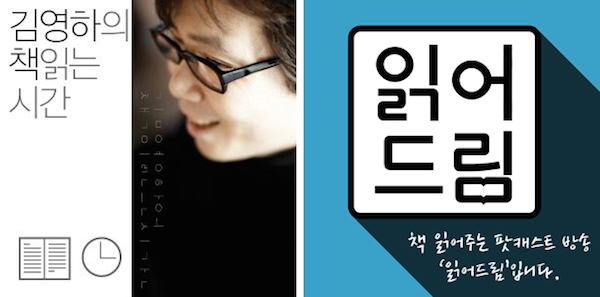Just before moving to Korea, my girlfriend and I bid farewell to the United States with two road trips, one north from Los Angeles up past the border to Vancouver and back, and another east all the way to North Carolina. As every aficionado of the Great American Road Trip Knows, not only does the journey matter more than the destination, the soundtrack matters almost as much as the journey. Historically, this has meant which radio stations you tune into as you go from one broadcast territory to another; more recently it has meant which cassettes, then CDs, and then MP3s you stack up into a personalized playlist.
Now, though, we have a convergence of the ways of listening to all these media: the podcast, which essentially lets us assemble whole personalized radio stations of our own. Podcasting has had something of a slow burn in America, taking at least a decade to make an impact on common listening habits, but in Korea it has blown up. And so our final road trips of this stint of our U.S. life found us binge-listening, as we drove past the grievance-punctuated agricultural lands of California, the Krazy Kat backdrops of Arizona and New Mexico, the vast windmill fields of the Texas panhandle, and the thick treescapes of Arkansas, to entirely Korean-language programming, the fruits of that podcasting explosion, motivated partially by a desire to prepare for our next cultural shift, and partially by my desperation to increase my vocabulary before I would really need it.
Not only did we listen to only Korean podcasts, we listened to only one kind of Korean podcasts: the book-reading show. I’ve made up that name myself, not knowing quite what to call them, but they’ve definitely made an impact on the world of Korean podcasting. The best-known example, which we marathoned all the way up and down the West Coast, is Kim Young-ha’s Time to Read a Book (김영하의 책 읽는 시간). Almost every episode in its sizable archive takes the same form: Kim, himself one of Korea’s internationally best-known writers (whom I profiled here in the LARB back in 2013), picks out a short story or part of a novel, reads it aloud, then talks anywhere from just a little to quite a bit about the chosen work and its place in his reading life.
Over the years, Kim has podcast the writings of a wide variety of his colleagues Eastern and Western, living and dead, including Franz Kafka, Italo Calvino, Albert Camus, José Saramago, Mario Vargas Llosa, Paul Auster, J.M. Coetzee, Raymond Carver, F. Scott Fitzgerald, Bill Bryson, Roald Dahl, Bertrand Russell, Patricia Highsmith, Yukio Mishima, Ryu Murakami, and such fellow Korean writers as Kim So-yeon, Kim Ki-taek, and Lee Ki-ho (previously seen here in my post on the Seoul Book and Culture Club). He also, on theory that the best reader of an author’s work is the author himself, occasionally reads bits and pieces of his own writing.
You can hear more of Kim Young-ha’s prose read aloud on another podcast, whose dual-language pun of a title I can only translate with difficulty, more literally as Reading Aloud or with more license as something like Read, Dream (읽어 드림). Its host Kim In-young launched it in 2013, partially in homage to Time to Read a Book, beginning with back-to-back episodes showcasing stories by Kim Young-ha. The rest of its author roster includes George Orwell, Herman Melville, Oscar Wilde, O. Henry, Alain de Botton (an even more popular figure in Korea, it turns out, than in England or America), Antoine de Saint-Exupéry, and Haruki Murakami, whose body of work provides reading matter for many an episode.
Kim In-young’s tendency toward multi-part series concentrating on a certain writer or even a certain piece of writing counts as one of his show’s characteristics that sets it apart from its inspiration, all of which we got to know well as we listened own the length of Interstate 40. (We got to know the shampoo commercial that precedes the content of each and every episode especially well.) But last year he decided to cap off the episode count at 50, opening some space for a new book-reader to enter the Korean podcasting field.
Projects like these hybridize the podcast with another highly road trip-compatible form of modern listening: the audiobook. A Korean friend here who studies both English and Japanese makes use of regular audiobooks for language-learning purposes, listening to a novel (usually something, in either language, by that supremely translatable Haruki Murakami) in his earbuds as he goes about his day, over and over “until I almost memorize the whole thing.” That learning potential, in part, motivated me to listen to nothing but these two podcasts, which take the audio book concept and break it down into bite-size chunks with light commentary, in the run-up to my move here.
The English-language podcasting world also has shows whose authors read fiction aloud, though usually with a focus on original material or on one particular genre. The emergence of the general-interest Korean book-reading podcast reflects the rising popularity of book culture itself in Korea, a place where literature has of course always existed, but where it has only in recent decades enjoyed an increasing abundance of avenues into everyday life. Plenty of other book-oriented Korean podcasts exist (I personally like the conversation-driven Red Book Cafe (빨간 책방)), but only shows like Kim Young-ha and Kim In-young’s take me back to the pleasures of school read-aloud time — probably because they remind me of how many words I still have to learn.
You can follow Colin Marshall at his web site, on Twitter @colinmarshall, or on Facebook. Catch up on the Korea Blog’s archives here.


